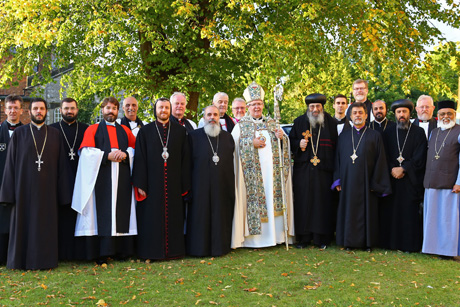When the Episcopal Church consecrated +Gene in 2003, the Oriental Orthodox churches withdrew their participation in the Anglican-Oriental Orthodox International Commission. Then, ten years later they returned to the conference table and picked things up where they were previously left. The participants from the two groups of churches spent the past week in the Diocese of St Asaph in North Wales. They were hosted by the bishop diocesan, the Rt Revd Gregory Cameron, “Ecumenical dialogue can be long, but beneath the process is the love shared between Christians, and it is that love and affection which draws us together and back to dialogue and mutual understanding.”
The result of the meeting in Wales was the final hammering out of a common statement concerning one of the longest held riffs between certain Eastern churches & Western Christianity, the Incarnation of Christ. The split began with the Council of Chalcedon held from 8 OCT through 1 NOV 451 CE in Asia Minor. The majority of Christian churches represented at Chalcedon, including the Eastern Orthodox churches, accepted the council’s understanding of Christ’s two natures, God and human. However, the churches which together became known as the Oriental Orthodox churches could not accept the decision.
The Confession of Chalcedon provides a clear statement on the human and divine nature of Christ:
We, then, following the holy Fathers, all with one consent, teach people to confess one and the same Son, our Lord Jesus Christ, the same perfect in Godhead and also perfect in manhood; truly God and truly man, of a reasonable [rational] soul and body; consubstantial [co-essential] with the Father according to the Godhead, and consubstantial with us according to the Manhood; in all things like unto us, without sin; begotten before all ages of the Father according to the Godhead, and in these latter days, for us and for our salvation, born of the Virgin Mary, the Mother of God, according to the Manhood; one and the same Christ, Son, Lord, only begotten, to be acknowledged in two natures, inconfusedly, unchangeably, indivisibly, inseparably; (ἐν δύο φύσεσιν ἀσυγχύτως, ἀτρέπτως, ἀδιαιρέτως, ἀχωρίστως – in duabus naturis inconfuse, immutabiliter, indivise, inseparabiliter) the distinction of natures being by no means taken away by the union, but rather the property of each nature being preserved, and concurring in one Person (prosopon) and one Subsistence (hypostasis), not parted or divided into two persons, but one and the same Son, and only begotten God (μονογενῆ Θεόν), the Word, the Lord Jesus Christ; as the prophets from the beginning [have declared] concerning Him, and the Lord Jesus Christ Himself has taught us, and the Creed of the holy Fathers has handed down to us.
1564 years later, the churches of the Anglican Communion and the Oriental Orthodox churches have reached an agreement on a common understanding on the nature of Christ. The Oriental Orthodox members of the Commission believe that the Anglican – Oriental Orthodox statement is groundbreaking and could serve as a model for future dialogue to heal the schism between the Eastern Orthodox churches and the Oriental Orthodox churches. In addition to the dialogue regarding Christology, the Commission was able to reach further accord on another issue dividing the churches since Chalcedon concerning the Holy Spirit.
The Commission is slated to meet again in Lebanon from 24-29 OCT 2016. The intent is to take up further conversation regarding the Holy Spirit.
The photo is from the Anglican Communion News Service, where you may read more about the Commission meeting in Wales.
The full statement from the Commission is here.

